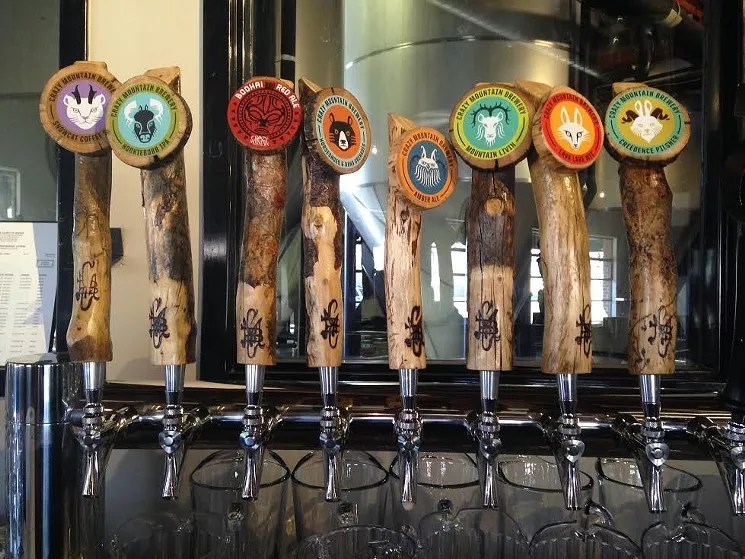
Crazy Mountain Brewing

Audio By Carbonatix
It’s no secret that Denver’s Crazy Mountain Brewing has dealt with a string of missteps and setbacks over the past two years. The company was evicted from its original home in Edwards in early 2018 because it didn’t pay the rent, then kicked out of a second location in Winter Park just a few months after opening there. Weeks later, the owners of a Crazy Mountain-branded location in Glendale’s CitySet were also evicted.
Through all that, the business struggled to find its footing at its primary location, in the cavernous former Breckenridge Brewery space at 471 Kalamath Street.
But the brewery isn’t giving up. At the end of May, its board of directors, which represents the twenty or so investors who own the company, voted to replace Crazy Mountain founder and CEO Kevin Selvy with Barry Watkins, a longtime banking executive and consultant who has been CFO of the brewery for nearly two years. Selvy will continue to serve as president of the board.
“This is normal in the growth of a business like a brewery. It takes a visionary to get a brewery to this level. But at some point you have to unshackle the visionary from sweeping the floors so that they can continue to drive the vision,” Watkins says of Selvy. Translation: The investors need the company to stop getting evicted from extra locations and start making money with its basic business. That could be a tall order in the competitive craft-beer industry, though, where even the most well-known, well-run breweries are facing serious headwinds.
Watkins doesn’t offer specific details on how he hopes to help Crazy Mountain turn the corner, but he says the company will focus on brewing and canning quality suds. “We had a burst of energy that I would characterize as an over-expansion,” he says of the brewery’s past few years. “So we had to drill down on what the core of our business is – developing recipes and growing our core brands.”
In late June, for instance, Crazy Mountain plans to re-launch its Local Stash series, which is made up of experimental or one-off small-batch beers. The new format will be packaged in more consumer-friendly twelve-ounce bottles rather than 750 ml bottles.

Crazy Mountain Brewing
The packaging on the series will also help the brewery explain its somewhat complex branding concept, which creates surrealistic hybrids that mash up three animals that live in Colorado. For example, Magnus, the creature on Hookiebob IPA, has the head of a bison, the antlers of a moose and the body of a grizzly bear. And each animal also represents a part of the brewing process.
Crazy Mountain is relying on its canned beer sales as well. In January, supermarkets and convenience stores in Colorado began carrying full-strength beer at all of their locations. While this change will likely turn out to be tough on smaller breweries, it’s a boon to the larger breweries that have enough capacity to regularly supply hundreds of retail locations. Although Crazy Mountain isn’t nearly as big as Ska Brewing or Left Hand or Odell, it does have a lot of capacity. As a result, consumers can now find Crazy Mountain beers in more than 100 grocery stores.
“It’s a really interesting moment, and the effect of the change in the law has been difficult to estimate, but we have been a huge beneficiary,” Watkins says.
A third strategy is to dial in existing contract-brewing business. While Crazy Mountain has been brewing beers for other companies since 2015, when it took over the 471 Kalamath space, Watkins acknowledges that the output has been inconsistent – and Crazy Mountain has lost a number of contract customers.
But the company recently invested $150,000 in quality-control measures, and plans to grow the business. “Our more casual approach wasn’t benefiting them or us,” Watkins says of the breweries that made their beer there. “Now I think we are going to grow that business carefully and practically.” Contract brewing could eventually make up 15 to 20 percent of Crazy Mountain’s output, he estimates.
In other moves, Crazy Mountain will ease its way out of a second branded location in Belmar this year, leaving it with just the 471 Kalamath space, where it will be able to rely on its experienced team of brewers to turn out “year-round beers that can fit into any market,” Watkins says.
“Contraction in the craft-beer business has affected us a lot, but our path has not been unusual for a growing business,” he concludes. “Now we’re going to focus on bringing beers to the market that consumers really want…and on making the business as profitable as possible.”